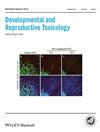Diabetes in the Cohen Rat Intensifies the Fetal Pancreatic Damage Induced by the Diabetogenic High Sucrose Low Copper Diet.
Q Environmental Science
Birth defects research. Part B, Developmental and reproductive toxicology
Pub Date : 2016-02-01
DOI:10.1002/bdrb.21169
引用次数: 3
Abstract
Intrauterine hyperglycemic environment could harm the fetus making it more susceptible to develop postnatal glucose intolerance. A possible mechanism is compromise of the fetal pancreatic development. We previously found that a high sucrose low copper diabetogenic diet induces type 2 diabetes in the Cohen diabetic sensitive rats, but not in the Sabra control rats. However, oxidative stress was observed in the placenta and term fetal liver of diabetic and nondiabetic controls. We now investigated whether the fetal pancreas is affected by this diet and whether the effects result from oxidative stress, maternal hyperglycemia, or both. Term fetal pancreases were evaluated for morphology, beta cells, oxidative stress, apoptosis, and DNA methylation. There were no microscopic changes in hematoxylin and eosin stained sections and beta cells immunostaining in the pancreas of fetuses of both strains. Fetuses of the sensitive strain fed diabetogenic diet had significantly higher activity of superoxide dismutase and catalase, elevated levels of low molecular weight antioxidants, and more intense immunostaining for nuclear factor kappa-B and hypoxia inducing factor-1α. Both strains fed diabetogenic diet had increased immunostaining for Bcl-2-like protein and caspase 3 and decreased immunostaining for 5-methylcytosine in their islets and acini. Our data suggest that maternal diabetogenic diet alters apoptotic rate and epigenetic steady states in the term fetal pancreas, unrelated to maternal diabetes. Maternal hyperglycemia further increases pancreatic oxidative stress, aggravating the pancreatic damage. The diet-induced insults to the fetal pancreas may be an important contributor to the high susceptibility to develop diabetes following metabolic intrauterine insults.高糖低铜饮食对糖尿病大鼠胎儿胰腺损伤的影响
宫内高血糖环境会损害胎儿,使其更容易发生产后葡萄糖耐受不良。一个可能的机制是胎儿胰腺发育受损。我们之前发现,高蔗糖低铜致糖尿病饮食在Cohen糖尿病敏感大鼠中诱导2型糖尿病,但在Sabra对照大鼠中没有。然而,在糖尿病和非糖尿病对照组的胎盘和足月胎肝中观察到氧化应激。我们现在研究了胎儿胰腺是否受到这种饮食的影响,以及这种影响是由氧化应激、母亲高血糖引起的,还是两者兼而有之。评估足月胎儿胰腺的形态学、β细胞、氧化应激、凋亡和DNA甲基化。两株胎儿的苏木精和伊红染色切片及胰腺细胞免疫染色均未见显微变化。敏感品系的胎鼠超氧化物歧化酶和过氧化氢酶活性显著升高,低分子量抗氧化剂水平显著升高,核因子κ b和缺氧诱导因子-1α免疫染色明显增强。两组小鼠胰岛和腺泡中bcl -2样蛋白和caspase 3的免疫染色均升高,5-甲基胞嘧啶的免疫染色均降低。我们的数据表明,母体糖尿病饮食改变胎儿胰腺的凋亡率和表观遗传稳定状态,与母体糖尿病无关。母体高血糖进一步增加胰腺氧化应激,加重胰腺损伤。饮食对胎儿胰腺的损伤可能是代谢性宫内损伤后发生糖尿病的一个重要因素。
本文章由计算机程序翻译,如有差异,请以英文原文为准。
求助全文
约1分钟内获得全文
求助全文
来源期刊
CiteScore
1.65
自引率
0.00%
发文量
0
审稿时长
>12 weeks
期刊介绍:
The purpose of this journal is to publish original contributions describing the toxicity of chemicals to developing organisms and the process of reproduction. The scope of the journal will inlcude: • toxicity of new chemical entities and biotechnology derived products to developing organismal systems; • toxicity of these and other xenobiotic agents to reproductive function; • multi-generation studies; • endocrine-mediated toxicity, particularly for endpoints that are relevant to development and reproduction; • novel protocols for evaluating developmental and reproductive toxicity; Part B: Developmental and Reproductive Toxicology , formerly published as Teratogenesis, Carcinogenesis and Mutagenesis

 求助内容:
求助内容: 应助结果提醒方式:
应助结果提醒方式:


